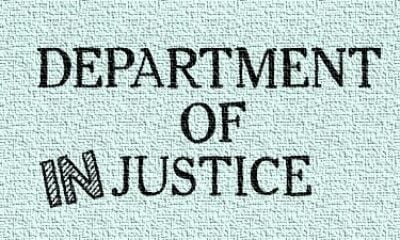

Business
Stuck in Long Lines? Mostly, Blame Yourself
Do masses of shoppers, who flood malls and scurry about, not know on what date holidays occurs each year?
Every year, following Thanksgiving, I find myself flummoxed at the shopping habits of the American populace. Do the great masses of shoppers who flood our shopping malls and scurry about not know on what date Christmas occurs? Does the date change from year to year?
Throughout the course of a year, do such shoppers not encounter gifts they know will be right for people on their shopping list? Are there no opportunities for them to procure these presents, wrap them in advance, store them in a closet, and then gift-wise have precious little to do at the year’s end?
Time is Money
I adopted a policy many years ago of buying items on the spot, like in Mid-July, when I knew they would fulfill part of my list. So, by the time late November and early December roll around, gift-wise I have very little to do.
If only such shopping madness was confined to holiday shopping or cruise vacations. All around me I see people who could handle small issues in advance so that cumulatively, they are not beset by an array of tiny tasks that end up looming larger perceptually than otherwise. Are people wedded to dealing with the aftermath of having too much to do, instead of managing the before hand? Let’s explore the issue.
I’ve been on 36 cruises and fortunately each one was worthwhile in one respect or another. Curiously, on cruises, as the ship pulls up to another port, all passengers are requested to display their ship’s card, which is electronically scanned by security. The card must also be presented after leaving a port and returning to the ship.
No Clue abut the Queue
Time after time, one sees long lines of people who don’t have their cards ready to be scanned as they re-enter the ship. Queuing theory holds that if 15 people spend an extra 20 seconds extracting their cards from their wallets and pockets versus extracting their cruise card in advance, 300 seconds or five minutes will accrue. During that five minutes, another 15 people or more might get in line.
After a few minutes of such behavior, the waiting line to board the ship can stretch to 20 or 30 minutes or more. Conversely, if everyone held their card, ready to be scanned, they could proceed past the scanner, military style, in what would represent record time. Instead of 20 to 30 minute lines forming, to get back on board, wait times would drop to under three minutes, if that long.
After the first shore visit, is it a surprise to the 2000 or so passengers that they’ll have to have their card ready to be scanned when they depart and when they re-enter the ship? Are they unaware after the first day? Are they all clueless?
On Dry Land
During non-Covid times, visit a movie theater any Friday or Saturday evening and as lines begin to form for the popular movies. You’ll notice perhaps only one in three patrons has their money or their credit card out and ready as they near the front of the line. Most theater patrons, however, reach for a billfold, wallet, or purse as it’s time to pay. Unfortunately added those extra seconds create lines for everyone behind them, that don’t need to occur.
Am I being too harsh when it comes to lines? How much of a burden would it be for people, who are third in line, to be prepared to pay so as to benefit all other theater goers standing behind them? How much longer will it be before people figure out that wait times in lines could be a fraction of what we generally experience?
– – – – –
We'd love to hear your thoughts about this article. Please take a minute to share them in the comment section by clicking here. Or carry the conversation over on your favorite social network by clicking one of the share buttons below.
Join the conversation!
We have no tolerance for comments containing violence, racism, profanity, vulgarity, doxing, or discourteous behavior. Thank you for partnering with us to maintain fruitful conversation.
Business
Work-Life Balance in Your Life
It the ability to experience a sense of control and to stay productive and competitive at work while maintaining a happy, healthy home-life
Work-life balance (WLB) is the ability to experience a sense of control and to stay productive and competitive at work while maintaining a happy, healthy home-life with sufficient leisure. WLB, also referred to by some as work-life harmony, work-life shift, work-life blend, work-life effectiveness, or work-life integration, requires focus and awareness despite seemingly endless tasks and activities competing for our time and attention.
Work-life balance entails having what I call “breathing space” for yourself each day, feeling a sense of accomplishment while not being consumed by work, and having an enjoyable domestic life without short-changing career obligations. WLB is rooted in whatever fulfillment means to you within the course of a day and a week, and however many years you have left in your life.
Supporting Disciplines
Several disciplines support work-life balance though, individually, none are synonymous with work-life balance:
1) Self Management
Sufficiently managing one’s self can be challenging, particularly in getting proper sleep, exercise, and nutrition. Self-management is the recognition that effectively using the spaces in our lives is vital, and that life, time, and available resources are finite. It means becoming captain of our own ship; no one is coming to steer for us.
2) Time Management
Effective time management involves making optimal use of your day and the supporting resources that can be summoned – you can only keep pace when your resources match your challenges. Time management is enhanced through appropriate goals and discerning what is both important and urgent, versus important OR urgent. It entails understanding what you do best and when, and assembling the appropriate tools to accomplish specific tasks.
3) Stress Management
By nature, societies tend to become more complex over time. In the face of increasing complexity, stress on the individual is inevitable. More people, noise, and distractions, independent of one’s individual circumstances, require each of us to become more adept at maintaining tranquility and being able to work ourselves out of pressure-filled situations. Most forms of multi-tasking ultimately increase our stress, while focusing on one thing at a time helps decrease stress.
4) Change Management
In our fast-paced world, change is virtually the only constant. Continually adopting new methods, adapting old, and re-adapting all methods is vital to a successful career and a happy home life. Effective change management involves offering periodic and concerted efforts so that the volume and rate of change at work and at home does not overwhelm or defeat you.
5) Technology Management
Effectively managing technology requires ensuring that technology serves you, rather than abuses you. Technology has always been with us, since the first walking stick, spear, flint, and wheel. Today, the rate of technological change is accelerating, brought on by vendors seeking expanding market share. Often you have no choice but to keep up with the technological Joneses, but rule technology, don’t let it rule you.
6) Leisure Management
The most overlooked of the work-life balance supporting disciplines, leisure management acknowledges 1) the importance of rest and relaxation, 2) that “time off” is a vital component of the human experience, and 3) that one can’t indefinitely short-change leisure without repercussions. Curiously, too much of the same leisure activity, however enjoyable, can lead to monotony. Thus, effective leisure management requires varying one’s activities.
Entirely Achievable
Achieving work-life balance does not require radical changes in what you do. It is about developing fresh perspectives and sensible, actionable solutions that are appropriate for you. It is fully engaging in life with what you have, right where you are, smack dab in the ever-changing dynamics of your existence.
– – – – –
Business
Work-life Balance: The Enduring Quest
Organizations today recognize the importance of supporting employees’ well-being while maintaining productivity
Thank goodness that organizations today increasingly recognize the importance of supporting employees’ well-being while maintaining productivity. As such, the corporate quest for work-life balance, harmony, and integration has gained great prominence.
Key Aspects
Here are 12 key aspects of this pursuit gleaned from a variety of programs:
1. Offer Flexible Work Arrangements: Offering flexible work schedules, remote work options, and part-time opportunities allows employees to better balance their professional and personal lives.
2. Have Clear Policies: Establishing clear policies and guidelines regarding work hours, overtime, and expectations helps employees manage their time effectively.
3. Support Mental Health: Providing access to mental health resources, counseling, and stress management programs can address employees’ emotional well-being.
4. Give Leave: Offering generous paid time off, including vacation, sick leave, and parental leave, allows employees to address personal and family needs without fear of repercussions.
5. Prevent Burnout: Encouraging employees to disconnect from work-related technology after hours helps prevent burnout and supports work-life separation.
6. Support Workload Management: Ensuring that employees have manageable workloads and realistic deadlines prevents excessive stress and long working hours.
7. Provide Wellness Programs: Implementing wellness initiatives, such as fitness facilities, nutrition programs, and health screenings, promotes a healthier work-life balance.
8. Enable Employee Assistance Programs: Such programs provide confidential counseling and support services for employees facing personal challenges.
9. Promote a Culture of Balance: Company culture plays a significant role in work-life balance. Leaders should model a balanced lifestyle, and the organization should celebrate accomplishments beyond work.
10. Maintain Continuous Communication: Engaging in open dialogues with employees about their needs and concerns regarding work-life balance fosters a supportive and responsive corporate culture.
11. Empower Workers with Training and Education: Providing training on time management, stress reduction, and resilience equips employees with the skills to better balance their lives.
12. Leverage Remote Work Policies: Crafting clear remote work policies and expectations ensures that remote employees have a structured work-life balance.
Bringing in the Hired Gun
As the world’s only holder of the title, “The Work-Life Balance Expert®,” as issued by the USPTO, I am often summoned by organizations to enhance work-life balance for their troops. In all, I’ve delivered programs and spoken to 960 groups. Below depicts an encounter with a company who shall remain nameless for reasons of confidentiality. See if this squares up with your experience in your organization.
The following responses were derived as a result of my sending a questionnaire to the conference meeting planner where I was to be their keynote speaker. I requested the names of 10 people who would be in the audience. I called each of them to discuss their current challenges. Here are their actual replies to three of my questions:
1) If you could magically resolve a work-life balance issue, what would it be?
* Have more breathing room between high-level projects.
* Accomplish more during the workday and leave mentally free.
* Hire more staff!
* Take vacations and time off with no big pile ups when returning.
* Be allowed to take some Fridays off and catch up on much needed appointments.
* Reduce the number of pop-up requests and questions flying at me all day long so that I could ACTUALLY do what I need to do each day.
* Be approved to work from home or adjust my hours. My personal time isn’t respected.
2) What do you seek to derive from attending a session such as mine?
* Manage my time more effectively.
* Gain tools to embrace life while living it
* Develop stronger skills.
* Make work-life balance a reality in our company’s work-first culture.
* Acquire strategies, tips, or ideas to re-think my approach.
* Learn to change my focus, to be more productive, balanced, and focused.
* Be able to balance the few things that I do control during my day.
* Discover tips for keeping my staff in balance.
* Gain a realistic expectation of what we can achieve or experience.
* Develop a more positive outlook for the group.
3) Are there any observations you could offer?
* Work-life balance is a huge topic organization-wide. We are high performers who want to do a good job. We compromise our personal lives to meet work demands. We have to keep pace with the leaders and teams we support. If we don’t, we’ll be deemed unresponsive.
* A frenetic pace seems to be inherent in this company. Our team does a good job of emphasizing work-life balance; the problem lies with the surrounding divisions that thrive on working all the time, for no good reason. Yes, we are in a global space, working in different time zones, but some of these people are beyond the pale.
* What I love about this organization are the people. They are dedicated to the cause and truly want to deliver reliable, affordable, dynamic, and versatile solutions to our customers. However, our frenetic pace isn’t necessary. Not every project is the most vital. Not every problem is an emergency. Not every request has to be filled now.
* If in charge, I’d implement a more efficient, logical pace organization-wide. If we all took a breath and reevaluated how we work, in a more focused environment, we might find that we could produce better results with less stress.
Resonates Strongly
As you can see, the topic of work-life balance resonates strongly among today’s career professionals. Going forward, may more organization recognize and acknowledge the critical role that employee wellness and work-life balance has on the organization’s overall effectiveness.
– – – – –












